In the land of Dune
A visit to Jordan, the little kingdom in a tough neighbourhood
With prophetic foresight, I decided to book a holiday to the Holy Land back on October 5, seeing as the region seemed pretty quiet these days.
My mother was approaching her 80th birthday and had always wanted to see the desert. She liked the romance of it and had often talked about her admiration for Bedouin hospitality – they had once saved her cousin, stranded in the desert in Saudi Arabia. When I was ten, she had even taken me and a friend to the cinema to watch the brilliant but endless Lawrence of Arabia (my friend fell asleep roughly at the point Omar Sharif turned up). Yet in eight decades she had never seen the desert up close, nor watched the sun set over the sand.
This was my present to her. We’d been on many adventures together, from my first overseas trip to Rome as a baby some forty-five years ago, and this might be our last. I wanted it to be special.
Jordan seemed like the obvious choice. It was, after all, where the David Lean epic was set and filmed, in Wadi Rum, an otherworldly place in the south of the country that also featured in The Martian and the desert world Arrakis in Dune. It has a huge amount of historical sites, including many associated with early Christianity; it also has a curious and interesting relationship with Britain and is ruled by the Hashemites, of whom I am a great admirer. Under their rule the kingdom has been an oasis of calm in a difficult region, so it seemed like a few days in the Middle East could provide a nice relaxing break.
Anyway, two days after booking the trip and the situation once again took a turn for the worse. I occasionally looked at the Foreign Office website for updates, but it suggested that the country is safe despite there being a terror threat. Yet despite the region’s succession of tragedies, the authorities in Jordan have been very successful in keeping the country safe these past couple of decades. The last fatal attack on civilians was way back in 2005, when three hotels were targeted, and ISIS and its confederates are extremely unpopular here. The only hint of danger is that major hotels in the capital have security checks on the way in, and there are a fair amount of police at tourist spots, although this is probably more to protect them from scammers.
It felt very safe, but for people booking their spring holidays, the whole region must seem worth avoiding right now. Everywhere we went local people said that numbers are hugely down, although Petra was busy enough to make me wonder if it must reach Carcassonne-levels of tourist intensity in happier times.
Amman, the capital, was historically not a major city, as I read in Jan Morris’s The Hashemite Kings, which tells the story of how the guardians of Mecca came to rule this corner of the Middle East. (Morris was James when s/he wrote that book, later becoming one of the earliest and most prominent transexuals, as the term was then.)
Jordan’s rise to statehood is an unlikely and touching story of Anglo-Arab friendship, although marred by a great sense of betrayal over *that* issue. Its survival is all the more surprising, considering it had everything set against it.
Its origins lie in the Arab revolt, which was led by the Hashemites, traditional guardians of Mecca. Their patriarch Hussein bin Ali, King of Hejaz in what is now western Saudi Arabia, had established connections with the British in the years before the war, and these would solidify after the conflict erupted. His son Faisal is portrayed in the film, with all the racial delicacy of the time, by Alec Guinness, while Lean’s epic also portrays the Arab forces as Bedouin dressed in traditional garb, although in reality they wore British-style fatigues; admittedly that would have been looked less romantic.
The Arab revolt succeeded in driving out the Turks but ended in bitterness; the British had secretly made a deal with France to carve out the region, while also promising Palestine to the Zionists. Hussein’s family were also edged out of their homeland by the House of Saud, who had the backing of the puritanical Wahhabis.
Instead, the Hashemites were given two separate mandates under British control; Faisal, became King of Iraq and his brother Abdullah, Emir of Transjordan, a region of 350,000 people with none of the advantages of its neighbours.
It was here that Abdullah, great-grandfather of the current king of the same name, ‘established his capital in Amman, a dusty, shabby, frankly provincial town in the Edomite hills, where Og the King of Bashan, last of the race of giants, had left his bed of iron in the Book of Deuteronomy.’
Abdullah’s new realm was not promising. Only a thin strip on the very western edge is fertile, and ‘it produced nothing very much, made nothing at all, was economically unviable and geographically nonsense. Its principal town was the one-horse Amman. Its most famous places (Jerash, Petra, Kerak) were all ruins.’ Its forests were all gone, ‘it had hardly any roads, only one railway line, virtually no schools, no police, and no very logical raison d’etre.’ On top of this, and unlike in Saudi Arabia or Iraq, there was no oil under the ground.
In 1925 the House of Saud took Mecca, and ‘for the first time since the twelfth century there was no Hashemite guardian of the Holy Places.’ Hussein ‘never recovered from the shock of what he considered to be British duplicity’ over both its wartime agreements and its failure to support his fight with the Saudis, and sailed away with the Royal Navy to Cyprus filled with bitterness.
Then, after the Arabs lost the 1948 war with Israel, the Kingdom of Jordan, as it had now become, was cut off from its historic trade route to the Mediterranean, left with only the then undeveloped port of Aqaba. And this was only the start of its problems.
Amman, known in the ancient world as Philadelphia, is situated on seven hills and on the most prominent, from where one can see over the city, lies the ancient Citadel. Here, on our first day in the country, we hired a guide at the box office, a warm and gentle middle-aged man called Ali, who spoke perfect English and loved nothing more than talking about history. The ancient citadel was largely empty of visitors, and our guide reflected sadly that tourism numbers were down by up to 75%.
Jordan had many disadvantages, Ali pointed out. It had taken in huge numbers of refugees, not just from Palestine but also Iraq and Syria, and it hadn’t enough water for its extended population.
But it had two key benefits; because the population is overwhelmingly Sunni Muslim, there is none of the religious division that has marred neighbouring states. Jordan has a small Christian minority – around 1-2% - and a tiny number of Druze, and so unlike Iraq, Syria or worst of all Lebanon, it has never been racked by sectarian problems.
Secondly, he pointed out, ‘wise leadership’, by which he meant the Hashemites.
The Arab world has been plagued by leaders who were either economically illiterate, corrupt or bloodthirsty, and often all three; Gaddafi, Saddam, Nasser, the Assads. Human capital has fled these bad presidents yet Jordan is lucky to have a monarchy.
But there are problems; talking us through the ruins of the intricate Roman water system, he pointed out how water has always been the most important issue to rulers of this land, and reflected that the problem had become worse in recent years, due to climate change. Jordan is trying to deal with the water problem with an ambitious desalination plant, but it currently stands as the number one most water-starved country.
Being in the ruins of civilisation reminds one of its fragility. Amman is considered one of the oldest continually inhabited places on earth, and its citadel bears testimony to the various nations and empires which ruled it, from the Aramaic speakers to Hellenistic Greeks, Romans and Umayyads. But the city was wrecked by an earthquake and for centuries lay largely empty, until the late 19th century when it became a stop on the Mecca railway built by the Ottomans (with German help).
It was also settled by Circassians who had fled the Balkans as the Ottomans retreated, and also from their native Caucasus following conquest by the Russians. The Circassians still form an important role as a royal guard, and like the Bedouin, their loyalty to the Hashemite dynasty is absolute.
Indeed the majority of the country’s population descend from refugees, something shared perhaps only with Israel. After 1948 and again in 1967, hundreds of thousands of Palestinians fled east, but unlike many of the surrounding countries, Jordan gave most citizenship; so as with the many Mizrahi Jews who left Arab countries, they have been able to establish new lives.
Ali’s grandparents had fled Palestine in 1948 and he hadn’t been allowed to visit their old village, but he was philosophical about it. He said that people were upset and angry about the war but that we wouldn’t find any hostility. That was true enough. But we didn’t talk about politics that much; he was more interested in the past, which I’m always more comfortable with, and in this part of the world, the more ancient, the better.
****
Hussein’s son, the first Abdullah, had been ‘a king with a twinkle in his eye’, in the words of Alec Kirkbride, one of the British officials who had been charged with administering the region after the Great War ended. As Morris put it, ‘Abdullah ran his affairs with a hey-nonny-no and a fine careless rapture (his passion for poetry was insatiable)’.
In this he was helped by John Bagot Glubb, ‘the most famous of the Anglo-Arab patriarchs. He came to Transjordan a young man with a mission, resolved to reconcile East and West, to interpret Western ways to Arab minds. He had won over the Bedouin tribes with ‘trust and friendship,’ and they soon ‘gave him their affection – some even followed him from Iraq.’
Glubb Pasha, as he was known, would become an important figure in Jordan’s rise to nationhood, and ‘he and Abdullah had liked each other at sight’. Indeed, the red and white chequered keffiyeh sold to tourists here was Glubb’s creation.
Abdullah had warm friendships with many of the British stationed in Transjordan, in particular with Kirkbride, who had now become British ambassador in Amman. Morris wrote how ‘When people speak, with a catch in their voice, about the good old days when Arabs and Englishmen were friends, united in a gentlemanly open-air understanding, they have in mind just such an intimacy as linked Abdullah with Alec Kirkbride.’
Kirkbride saw Abdullah twice a week officially, but they regularly met in private and he spent weekends at the royal palace: ‘There the company would while away the evenings talking, listening to music, or hearing the Amir recite impromptu verses, for all the world as in the cultured pleasure-lodges of the Umayyads’.
The two men ‘shared a sense of rough-hewn humour – at grand dinner parties in Europe where only they spoke Arabic, the Emir delighted in making outrageous comments upon their fellow-guests, and watching the resident’s frenzied efforts to interpret them’ politely.
Despite the growing troubles in Palestine, the Anglo-Jordanian friendship grew and ‘so it was that when, in 1939, Britain found herself at war again, only the Hashemite Emirate of Transjordan, among all the Arab states, stood unquestionably at her side. To be sure, no other Arab country had quite the same inducements to loyalty: but it remains true that Abdullah and most of his people supported the British cause, by no means a sure winner, without hesitation, complaint or direct compulsion.
‘The Arab Legion, now commanded by Glubb, was still minute. Nevertheless, as soon as war was declared in Europe Abdullah cabled the British Government offering to send it anywhere in the world.’
The great conflagration was soon followed by a conflict which is still ever-present in the region, the 1948 Arab-Israeli War in which Glubb led the Arab Legion. The Arabs performed poorly, although Transjordan’s Arab Legion was the most effective, and ended up controlling a rump of the mandate which is now called the West Bank.
Defeat further stoked Arab nationalism, encouraged by Soviet Russia, which the Hashemites considered a sworn enemy and a snake in the grass, asserting – correctly - that communism was incompatible with nationalism.
After Nasser swept to power in Egypt, becoming a client state of the Soviet Union, the Hashemites faced a growing threat from both Egypt and its ally Syria. Meanwhile, Britain’s power was fading, and ‘before long the governing friendship between the British and the Hashemite kings became a sad and doomed anachronism.’
Abdullah was assassinated in 1951 in Jerusalem, and standing beside him his 15-year-old grandson Hussein was only saved by a medal on his uniform which deflected the bullet, the first of at least 25 attempts on his life.
Things were going to get worse for Hussein; his father Talal had a serious mental illness, possibly schizophrenia, and there followed a session of parliament agreeing that he would be replaced by his son; when King Talal was told, he only said ‘I had expected it. Please thank the Government and the people.’ Far away at Harrow School, his 16-year-old son learned of his new role when a letter arrived addressed to ‘His Majesty King Hussein’.
A foreign policy analyst in the immediate post-war period might have identified Jordan as the country most likely to fall to revolution and chaos, as was the fate of its sister kingdom in Iraq. By the mid-1950s it had become dangerously insecure, and in 1957 a coup was launched by a cabal sympathetic to Nasser-style nationalist socialism. The ultra-loyal Bedouin units, told they were moving for exercises, became suspicious and went to the king; an appeal to the British was met immediately by Harold MacMillan who sent paratroopers from Cyprus to save his throne.
Jordan survived yet another crisis in 1970, when Palestinian militants tried to overthrow the regime, and has suffered a series of blows since, including the failure of the Oslo Accords and the invasion of Iraq in 2003, which hugely put up the price of oil among other things. They have also taken in further bundles of refugees, including from both Iraq and Syria. Tourists only get a brief view of a country but there is clearly a great deal of poverty here, especially on the outskirts of cities where many people are living in tents.
Tourism is obviously an important part of its economic strategy, and in his memoir, Uneasy Lies the Head, King Hussein talked of the potential of his kingdom, a place one might see ‘where Christ was baptised. Further on is Mount Nebo, where Moses stood when he looked across to Canaan. The traveller in search of novelty can lie on his back and smoke a cigarette as he floats in the saline waters of the Dead Sea, the lowest point on the earth, 1,200 feet below Sea level. In the heart of the Jordan Valley, the Dead Sea shimmers like a burnished tray with the mountains of Judea and Moab enclosing it. As the sun sinks one can sometimes see in the far distance the spires on the Mount of Olives, tiny black outlines against the red sun.
’
That is all true, although one might add the warmth one encounters. A friend had recently visited Jordan with his wife and infant daughter and remarked on how friendly everyone was to young children, with soldiers stopping to coo over his little girl, and the same is true of the elderly (if mum is prepared to accept their label). After the citadel we stopped by one of the city’s hills to take a look at the Roman amphitheatre, and local men went to get a chair for mum to sit down on, a sense of consideration we repeatedly experienced. We found the same friendliness in Jerash, an impressively extensive Roman city, with two amphitheatres and the ruins of two temples from which the whole area can be seen. A couple of men there were even playing ‘Scotland the Brave’ on the bagpipes for any homesick visitors, another legacy of the British. Again, though, it was largely empty.
Amman is not the highlight of any visit here. Rainbow Street is pretty and worth visiting, and our modern day ‘El Lawrence’, Rory Stewart, has a shop there, although somewhat out of my price range. I did almost buy a Byzantine coin from a Christian antiquarian in the street, but I thought of my bank balance and better of it.
The most attractive sites lie in the south of the country. On our third day we headed to Wadi Rum, made famous by the Lean film when it is grandly announced by the great Bedouin warrior Auda Abu Tayeh, a real-life figure just as terrifying impressive as Anthony Quinn betrayed him. (‘He had killed seventy-five enemies with his own hands, and had married twenty-eight wives,’ Morris pointed out.)
‘Welcome to Mars’, the young man running the desert glamping site Sun City Camp greeted us, and it really did look otherworldy, dotted with these strange-looking pods which resemble the sort of places Elon Musk dreams of sending us (although being mean, I opted for the cheaper rooms)
We got chatting to a young Bedouin who worked there; he came from a local tribe but spoke perfect English and wore western clothes, and he was knowledgeable about the history. He began explaining why Lawrence of Arabia was inaccurate, and I waited to hear him argue how it had underplayed the efforts of the Arabs and was too focussed on the British story. Instead, he went on to explain that the film omitted the role of women, in particular Gertrude Bell, and I couldn’t help but smile.
Here I am with a Bedouin explaining that women have been erased from history. Woke really has won.
Later, his cousin took us out on the back of a 4 x 4 to see how filmmakers have imagined other planets, and to visit the sites associated with the Arab revolt, including the old Ottoman railway line and the Seven Pillars of Wisdom.
After a couple of hours, we watched the sun go down. It was genuinely beautiful, and special.
It’s easy to pick up a romantic idea of a culture from a few day’s visit, and I’m fine with that. This is in essence what a tourist pays for; a warm feeling about meeting people without coming to understand a culture enough to offer a deep anthropological critique; this is also what distinguishes the tourist from the traveller, and I’m happy to be the former. The romance of the desert is why we were there, and in the evening we drank sweet tea by a fire, music was played, and we sat down in a giant space tent to eat.
King Hussein described how he loved to visit the tribes. ‘I was their king, but with them I did not feel lonely, I felt one of them. I was “Hussein” to them. The only protocol was that of the Bedouin, whose life is based on three concepts – honour, courage and hospitality. We believe that to be an honourable man you must have the courage to defend your honour. We believe that you must always show your hospitality. What is yours belongs also to your guests. Even an enemy has shelter and food once he reaches the camp of another tribe.’
But, paradoxically, the late king was also intent on modernising them, providing not just healthcare and work but also education. Many had done very well.
Saad, our guide in Petra, had four children, one of whom had won a scholarship to an American college, another studying in Italy. They were doing well. He he had come from a traditional Bedouin family, and showed us pictures of himself in traditional garb. Generation by generation things were getting better, but the current war had a devastating impact on tourism numbers and people were suffering badly. He felt a connection with the Nabateans who had built Petra, regarding them as his ancestors, and admired their religious tolerance in a slightly mournful way.
The Nabateans were a Semitic people who wrote in Aramaic but spoke a sort of Arabic, and left behind the first written proto-Arabic. They were a strangely attractive people; they grew very rich from trade and accounts suggest they didn’t engage in slavery, or at least it was minimal; they didn’t go in for lawsuits much, and they were also unusually tolerant towards other religions. Of course, the papyrus on which they wrote has been overwhelmingly lost and scarcity of direct sources means we’ll never probably learn enough to shatter this incomplete and idealised romantic view of them, but there’s no doubting the legacy they left with Petra.
****
Religious minorities are robably the biggest beneficiaries of monarchy in the age of people power. Just as Daniel Finkelstein’s grandmother used to say: ‘While the Queen is safe in Buckingham Palace, we are safe in Hendon central’, the same is true in this region.
Christians are small in number in Jordan, although a significant presence in Madaba, which is home to numerous churches. We also visited churches in Amman, including a Catholic and an Egyptian Coptic church opposite the King Abdullah mosque. There was notably little security, an increasingly rare situation in the region. By the site of the Baptism of Jesus we visited a beautifully-adorned church built in 2003, under the patronage of the king, the same year that the ordeal of Iraq’s Christians began with the invasion. Many fleeing that tragic country found refuge here.
At Mount Nebo we saw a Filipino Mass taking place on Easter Sunday, and on our final day we visited the spot where Jesus was baptised. It remains simple in style because they did not want it to become a Disneyland, Director-General Rustom Mkhjian told us. Mkhjian is of Armenian heritage, and his family had fled the genocide a century ago, receiving shelter from the Hashemites.
He explained how an Italian Franciscan and archaeologist, Michele Piccarillo, had established the authenticity of the site’s location, uncovering mosaics dating from the early Christian period. Piccarillo’s work was admired by King Abdullah, who gave the site royal support; when Piccarrillo died, the king had his body flown home on his aeroplane.
After travelling around in the same golf carts in which the King and Queen had entertained Pope Francis, Mkhjian spoke with genuine love and reverence of the old king, their protector: ‘you could see the love in his eyes’.
The reminder of the water crisis is present here, too. The Jordan River is tiny and getting smaller, and the Israeli flag flies only a few metres away. By this point I was wearing a red and white headscarf I’d bought in Petra, which probably made me look like a plonker to any Israeli guard who could see me. They probably imagined the pasty-skinned visitor with the keffiyeh was from some ridiculous part of north London like Crouch End (correctly, if so).
That side of the river is, of course, the West Bank, the status of which remains the subject of undending anger and conflict. I’m not optimistic about the region, and since our trip the situation has got worse with Israel and Iran swapping missiles. The conflict in Gaza is incredibly upsetting, but I’m not sure anyone is prepared for the compromises involved with lasting peace, and among Arab populations I don’t think we will see widespread acceptance of a Jewish state in any of our lifetimes. There is too much history. All of which is incredibly sad for people in the wider region who are powerless to do anything, but must also suffer the fallout as people are understandably scared away.
But for these two visitors to the Holy Land, there are only wonderfully warm memories from perhaps our last great adventure. As I checked out of our hotel in Amman the clerk thanked us for our stay and said: ‘I hope that Jordan will always be a second home to you’. Obviously, I would prefer a big house in the Dordogne to be my second home, but it was a lovely sentiment nonetheless. The cynic in me would normally assume this was a sales pitch, and that’s fine, but being a sentimental tourist I was inclined to believe him.


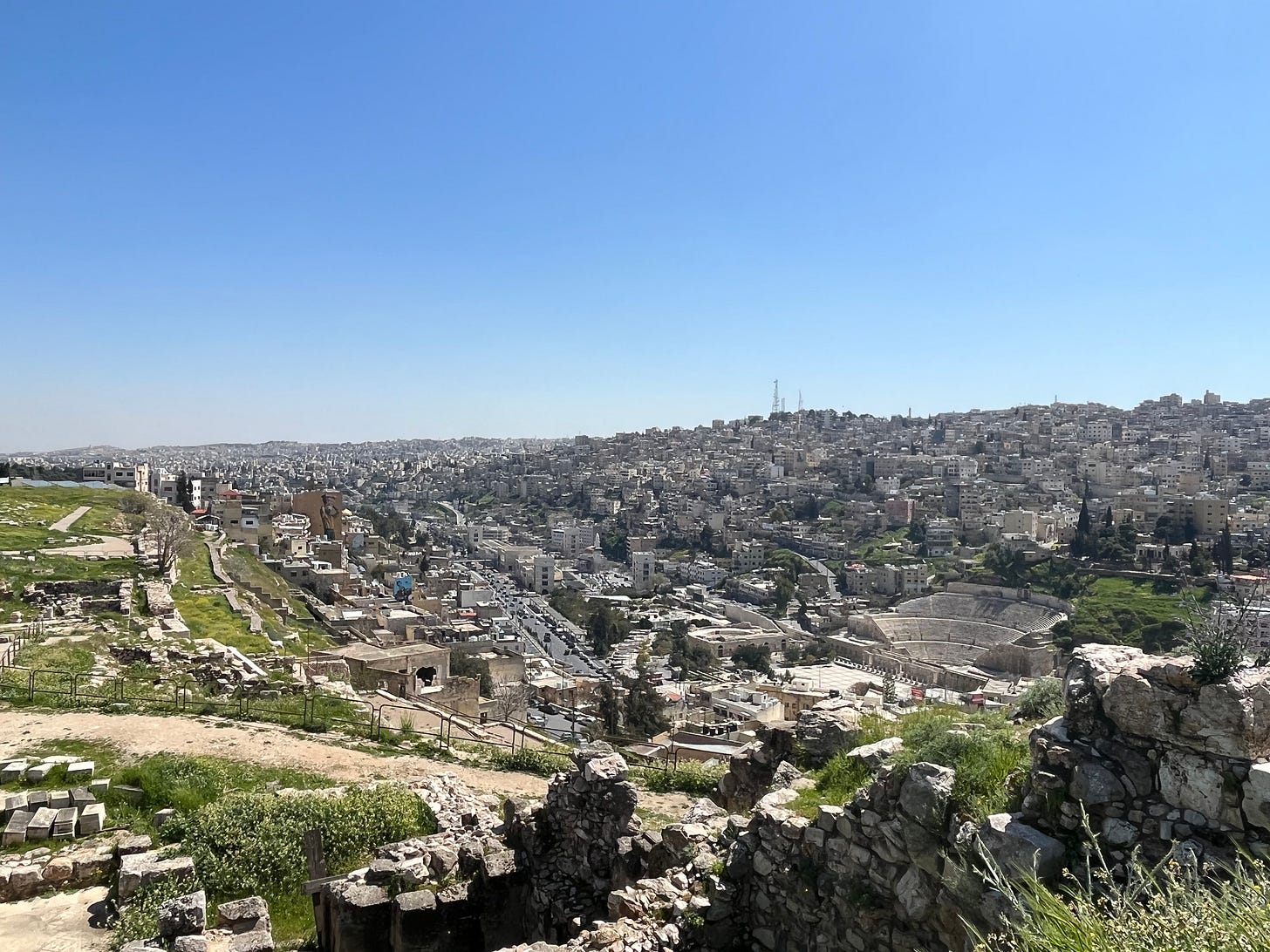

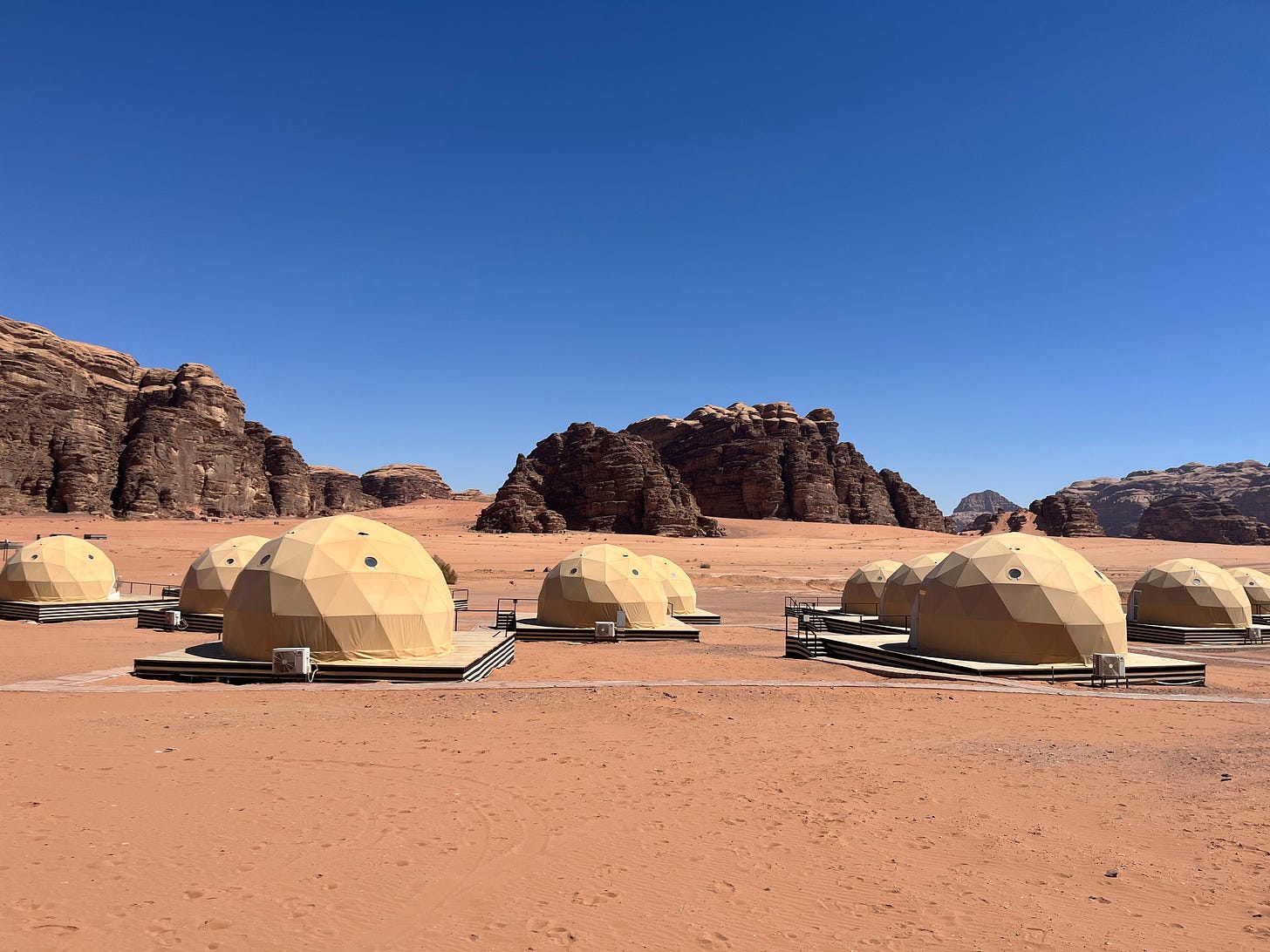
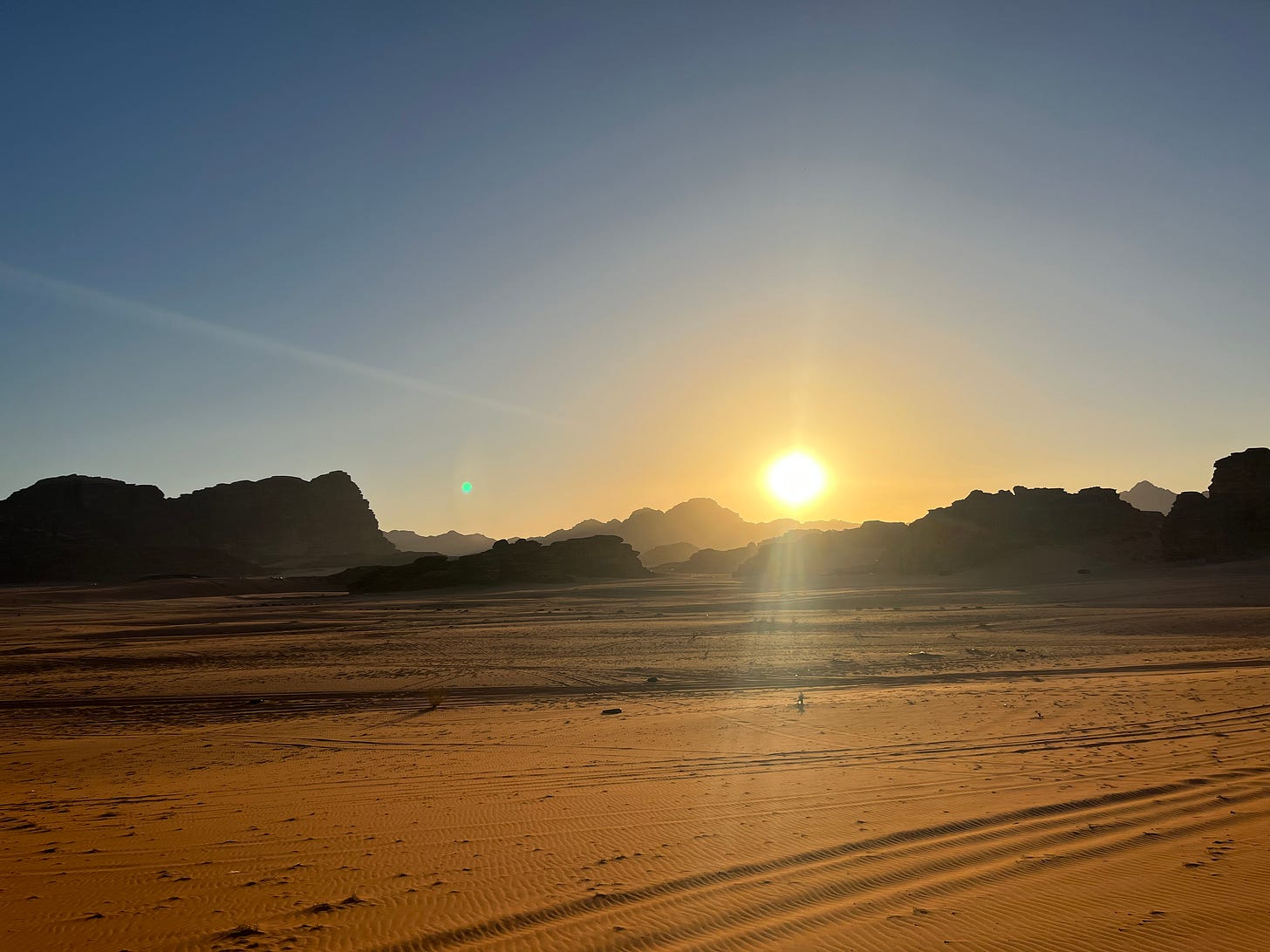
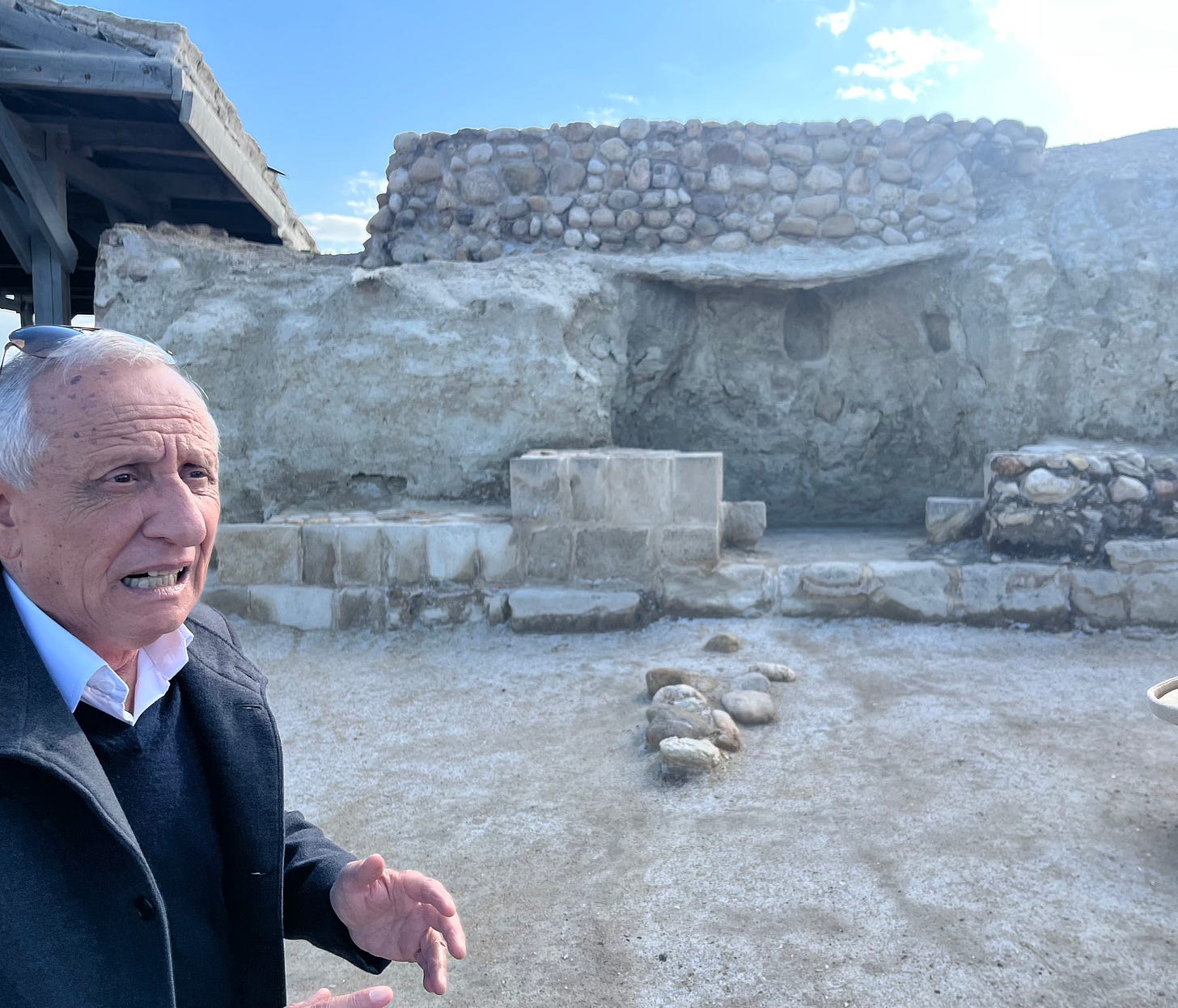
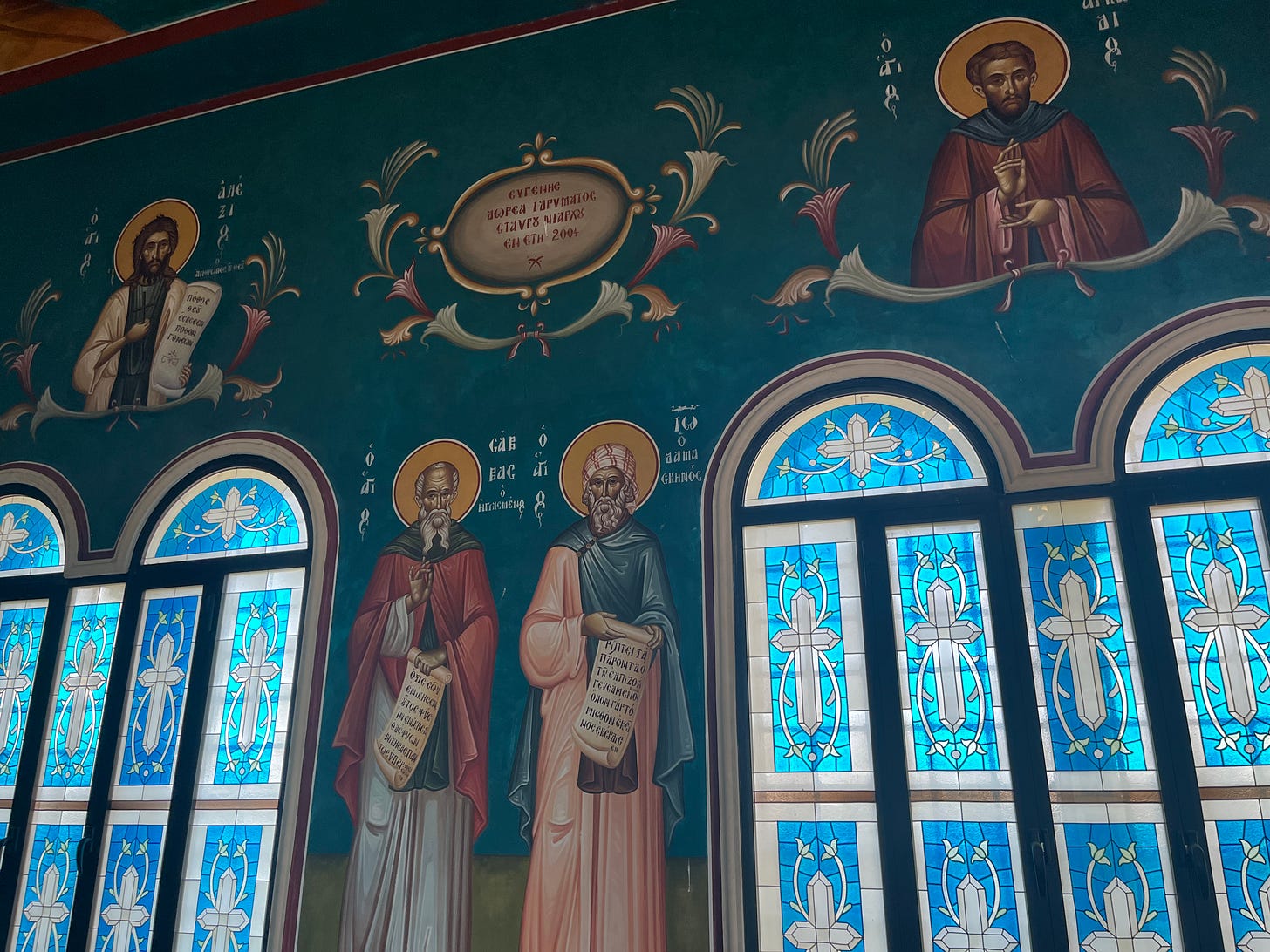
What a beautiful article, thanks so much
Great article. About 20 yrs ago, my guide said I hope Jordan will be like a second home to you! So maybe it's something they are told to say but it had a similar warming effect on me.